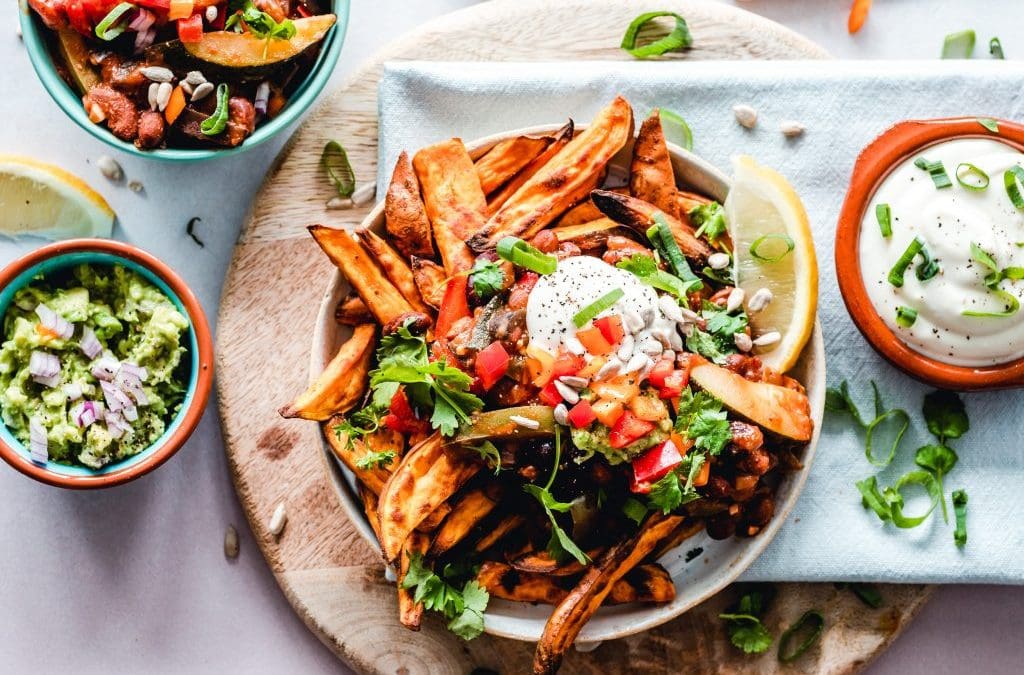Nutritional advice can often be conflicting and difficult to understand. We want to eat well to stay healthy, keep our weight within normal range but also use it to improve fertility and reduce our risk of conditions such as heart disease, diabetes and cancer.
Pretty much all health and wellness communities agree that diets emphasizing fresh, whole ingredients and minimizing processed foods are superior for overall wellness. The whole-foods, plant-based diet does just that. It focuses on minimally processed foods, specifically plants, and is effective at stimulating weight loss and improving health.
What exactly is a Plant Based Diet?
The first thing to say is that this isn’t necessarily a rigid set diet. It’s more of a lifestyle and approach to food as well as your environment. This is because plant-based diets can vary greatly depending on the extent to which a person includes animal products in their diet.
Some basic principles are listed below:
- Emphasizes whole, minimally processed foods.
- Limits or avoids animal products.
- Focuses on plants, including vegetables, fruits, whole grains, legumes, seeds and nuts, which should make up the majority of what you eat.
- Excludes refined foods, like added sugars, white flour and processed oils.
- Pays special attention to food quality, using locally sourced, organic food whenever possible.
For these reasons, this diet is often confused with vegan or vegetarian diets. Yet although similar in some ways, these diets are not the same.
People who follow vegan diets abstain from consuming any animal products, including dairy, meat, poultry, seafood, eggs and honey. Vegetarians exclude all meat and poultry from their diets, but some vegetarians eat eggs, seafood or dairy.
The plant based diet is more flexible. Followers eat mostly plants, but can eat animal products too, in moderation.

Why is it so beneficial to health?
Many studies have shown that plant-based diets are beneficial for weight loss. We’re facing an obesity epidemic at the moment and at no other time has it been more important to try and reverse this.
A review of 12 studies that included more than 1,100 people found that those assigned to plant-based diets lost significantly more weight, about 4.5 pounds (2kg) over an average of 18 weeks, compared to those assigned to non-vegetarian diets.
Adopting a healthy plant-based eating pattern may also help keep weight off in the long run.
A study in 65 overweight and obese adults found that those assigned to a plant based diet lost significantly more weight than the control group and were able to sustain that weight loss of 9.25 pounds (4.2kg) over a one-year follow-up period.
Just cutting out a whole load of processed food with sugar and additives, and increasing fresh produce full of antioxidants and fibre, can work wonders on your weight.
What are the other benefits?
The other main benefit of plant based eating is its ability to reduce inflammation in the body. Inflammation is your body’s way of protecting itself from infection, illness, or injury. This involves an increase in the production of white blood cells, immune cells, and substances called cytokines that help fight infection.
This sort of inflammation can occur with conditions such as endometriosis, polycystic ovaries, heart disease, diabetes and even cancer. Chronic inflammation can also happen when people are obese or under stress.
What Causes It?
Having an unhealthy lifestyle can often flare up, if not directly cause, some of these inflammatory conditions.
Consuming high amounts of sugar and refined carbs, such as white bread and pasta, can contribute to inflammation, insulin resistance, diabetes and obesity.
What’s more, eating processed and packaged foods that contain trans fats has been shown to promote inflammation and damage the endothelial cells that line your arteries, making you more susceptible to heart disease and stroke.
Vegetable oils used in many processed foods are another possible culprit. Regular consumption may result in an imbalance of omega-6 to omega-3 fatty acids, which some scientists believe may promote inflammation.
Too much alcohol and processed meat can also have inflammatory effects on your body.
And of course stress and lack of exercise can also promote inflammation too.

The Role of Your Diet
If you want to reduce inflammation, eat fewer inflammatory foods and more anti-inflammatory foods. You diet should be as clean and nutritionally dense as possible and include plenty of antioxidants.
Antioxidants work by reducing levels of free radicals. These reactive molecules are created as a natural part of your metabolism but can lead to inflammation when they’re not held in check.
Your anti-inflammatory diet should provide a healthy balance of protein, carbs, fats, vitamins, minerals and water at each meal.
Foods that are best avoided:
Some foods are associated with an increased risk of chronic inflammation.
Consider minimizing or cutting these out completely:
- Sugary beverages: Sugar-sweetened drinks and fruit juices
- Refined carbs: White bread, white pasta, etc.
- Desserts: Cookies, candy, cake, and ice cream
- Processed meat: Hot dogs, sausages, etc.
- Processed snack foods: Crackers, chips, and pretzels
- Certain oils: Processed seed and vegetable oils like soybean and corn oil
- Trans fats: Foods with partially hydrogenated ingredients
- Alcohol: Excessive alcohol consumption
Foods that are best to eat:
Include plenty of these anti-inflammatory foods:
- Vegetables: Broccoli, kale, Brussels sprouts, cabbage, cauliflower, etc.
- Fruit: Especially deeply coloured berries
- High-fat fruits: Avocados and olives
- Healthy fats: Olive oil and coconut oil
- Fatty fish: Salmon, sardines, herring, mackerel, and anchovies
- Nuts: Almonds and other nuts
- Peppers: Bell peppers and chili peppers
- Chocolate: Dark chocolate
- Spices: Turmeric, ginger, cinnamon, etc.
- Herbal Non Caffeinated Tea
There are also other benefits
Switching to a plant-based diet not only benefits your health, it can help protect the environment, as well. People who follow plant-based diets tend to have smaller environmental footprints.
The study reported that a 70% reduction in greenhouse gas emissions and land use and 50% less water use could be achieved by shifting Western diet patterns to more sustainable, plant-based dietary patterns .
What’s more, reducing the number of animal products in your diet and purchasing local, sustainable produce helps drive the local economy and reduces reliance on factory farming, which is not only cruel but also encourages pumping animals full of hormones to meet demands, all of which then filter down the food chain and start affecting our health, in particular increasing the amount of inflammation in the body, that has been linked to fertility related problems.
Foods to eat on a Plant-Based Diet
From eggs and bacon for breakfast to steak for dinner, animal products are the focus of most meals for many people. It’s not to say you can’t eat these foods, but they should be eaten in smaller quantities, with attention paid to the quality of the item.
Foods like dairy, eggs, poultry, meat and seafood should be used more as a complement to a plant-based meal, not as the main focal point.

What your shopping list should include:
- Fruits: Berries, citrus fruits, pears, peaches, pineapple, bananas, etc.
- Vegetables: Kale, spinach, tomatoes, broccoli, cauliflower, carrots, asparagus, peppers, etc.
- Starchy vegetables: Potatoes, sweet potatoes, butternut squash, etc.
- Whole grains: Brown rice, rolled oats, quinoa, brown rice pasta, barley, etc.
- Healthy fats: Avocados, olive oil, coconut oil, unsweetened coconut, etc.
- Legumes: Peas, chickpeas, lentils, peanuts, black beans, etc.
- Seeds, nuts and nut butters: Almonds, cashews, macadamia nuts, pumpkin seeds, sunflower seeds, natural peanut butter, tahini, etc.
- Unsweetened plant-based milks: Coconut milk, almond milk, cashew milk, etc, just making sure its fortified with Vitamin D and calcium
- Spices, herbs and seasonings: Basil, rosemary, turmeric, curry, black pepper, salt, etc.
- Condiments: Salsa, mustard, nutritional yeast, soy sauce, vinegar, lemon juice, etc.
- Plant-based protein: Tofu, soya (in moderation)
- Beverages: Water
If supplementing your plant-based diet with animal products, choose quality organic products from grocery stores or, better yet, purchase them from local farms.
- Eggs: Pasture-raised when possible.
- Poultry: Free-range, organic when possible.
- Beef and pork: Pastured or grass-fed when possible.
- Seafood: Wild-caught from sustainable fisheries when possible.
- Dairy: Organic dairy products from pasture-raised animals whenever possible.
Foods that are best avoided
The main premise of this diet is eating food in its cleanest most natural form possible. When purchasing groceries, focus on fresh foods and when purchasing foods with a label, aim for items with the fewest possible ingredients.
What to exclude from your shopping list
- Fast food: French fries, cheeseburgers, hot dogs, chicken nuggets, etc.
- Added sugars and sweets: White sugar, soda, juice, pastries, cookies, candy, sweet tea, sugary cereals, etc.
- Refined grains: White rice, white pasta, white bread, bagels, etc.
- Packaged and convenience foods: Chips, crackers, cereal bars, frozen dinners, etc.
- Artificial sweeteners
- Processed animal products: Bacon, lunch meats, sausage, etc

And there you have it, plenty of reasons to convert to a plant based method of eating, so give it a go and try out my recipes for inspiration which are not just great for your overall health, but specifically help to boost your own natural fertility!






